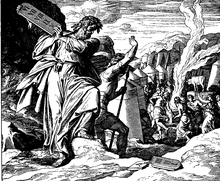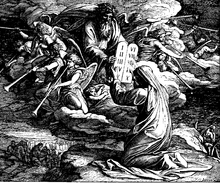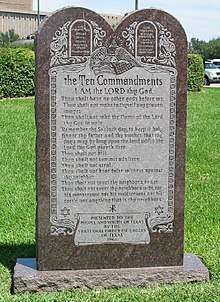- For the film, see The Ten Commandments (1956 film).
The Ten Commandments (עֲשֶׂרֶת הַדִּבְּרוֹת, Aseret ha'Dibrot), also known as the Decalogue, are a set of biblical principles relating to ethics and worship, which play a fundamental role in Judaism and Christianity. The commandments include instructions to worship only God, to honour one's parents, and to keep the sabbath day holy, as well as prohibitions against idolatry, blasphemy, murder, adultery, theft, dishonesty, and coveting. Different religious groups follow different traditions for interpreting and numbering them.
Quotes

"Thou shalt not get found out" is not one of God's commandments, and no man can be saved by trying to keep it. ~ Leonard Bacon

Let no debt remain outstanding, except the continuing debt to love one another, for whoever loves others has fulfilled the law. The commandments, “You shall not commit adultery,” “You shall not murder,” “You shall not steal,” "You shall not covet", and whatever other command there may be, are summed up in this one command: "Love your neighbor as yourself". Love does no harm to a neighbor. Therefore love is the fulfillment of the law. ~ Epistle to the Romans

For some reason, the most vocal Christians among us never mention the Beatitudes. But, often with tears in their eyes, they demand that the Ten Commandments be posted in public buildings. And of course that’s Moses, not Jesus. I haven't heard one of them demand that the Sermon on the Mount, the Beatitudes, be posted anywhere.
"Blessed are the merciful" in a courtroom? "Blessed are the peacemakers" in the Pentagon? Give me a break! ~ Kurt Vonnegut
"Blessed are the merciful" in a courtroom? "Blessed are the peacemakers" in the Pentagon? Give me a break! ~ Kurt Vonnegut
- "Thou shalt not get found out" is not one of God's commandments, and no man can be saved by trying to keep it.
- Leonard Bacon, reported in Dictionary of Burning Words of Brilliant Writers (1895), p. 511.
- DECALOGUE, n. A series of commandments, ten in number -- just enough to permit an intelligent selection for observance, but not enough to embarrass the choice. Following is the revised edition of the Decalogue, calculated for this meridian.
Thou shalt no God but me adore:
'Twere too expensive to have more.
Take not God's name in vain; select
A time when it will have effect.
Work not on Sabbath days at all,
But go to see the teams play ball.
Honor thy parents. That creates
For life insurance lower rates.
Kill not, abet not those who kill;
Thou shalt not pay thy butcher's bill.
Kiss not thy neighbor's wife, unless
Thine own thy neighbor doth caress
Bear not false witness -- that is low --
But "hear 'tis rumored so and so."
Covet thou naught what thou hast not
By hook or crook, or somehow, got.- Ambrose Bierce, The Cynic's Dictionary (1906); republished as The Devil's Dictionary (1911).
- Thou shalt have one God only; who
Would be at the expense of two?
No graven images may be,
except the currency:
not at all; for for thy curse
Thine enemy is none the worse:
church on Sunday to attend
serve to keep the world thy friend:
thy parents; that is, all
whom advancement may befall:
Thou shalt not kill; but needst not strive
Officiously to keep alive:
Do not adultery commit;
Advantage rarely comes of it:
Thou shalt not steal; an empty feat,
When it's so lucrative to cheat:
Bear not false witness: let the lie
Have time on its own wings to fly:
Thou shalt not covet; but tradition
Approves all forms of competition.
The sum of all is, thou shalt love,
If any body, God above:
At any rate shall never labour
More than thyself to love thy neighbour.- Arthur Hugh Clough, "The Latest Decalogue", in A. L. P. Norrington, ed., The Poems of Arthur Hugh Clough (1968), p. 60–61.
- Let no debt remain outstanding, except the continuing debt to love one another, for whoever loves others has fulfilled the law. The commandments, “You shall not commit adultery,” “You shall not murder,” “You shall not steal,” "You shall not covet", and whatever other command there may be, are summed up in this one command: "Love your neighbor as yourself". Love does no harm to a neighbor. Therefore love is the fulfillment of the law.
- Romans 13:8-10.
- For some reason, the most vocal Christians among us never mention the Beatitudes. But, often with tears in their eyes, they demand that the Ten Commandments be posted in public buildings. And of course that’s Moses, not Jesus. I haven't heard one of them demand that the Sermon on the Mount, the Beatitudes, be posted anywhere.
"Blessed are the merciful" in a courtroom? "Blessed are the peacemakers" in the Pentagon? Give me a break!- Kurt Vonnegut, Cold Turkey at In These Times (10 May 2004).
External links
This article is issued from
Wikiquote.
The text is licensed under Creative
Commons - Attribution - Sharealike.
Additional terms may apply for the media files.